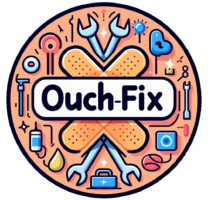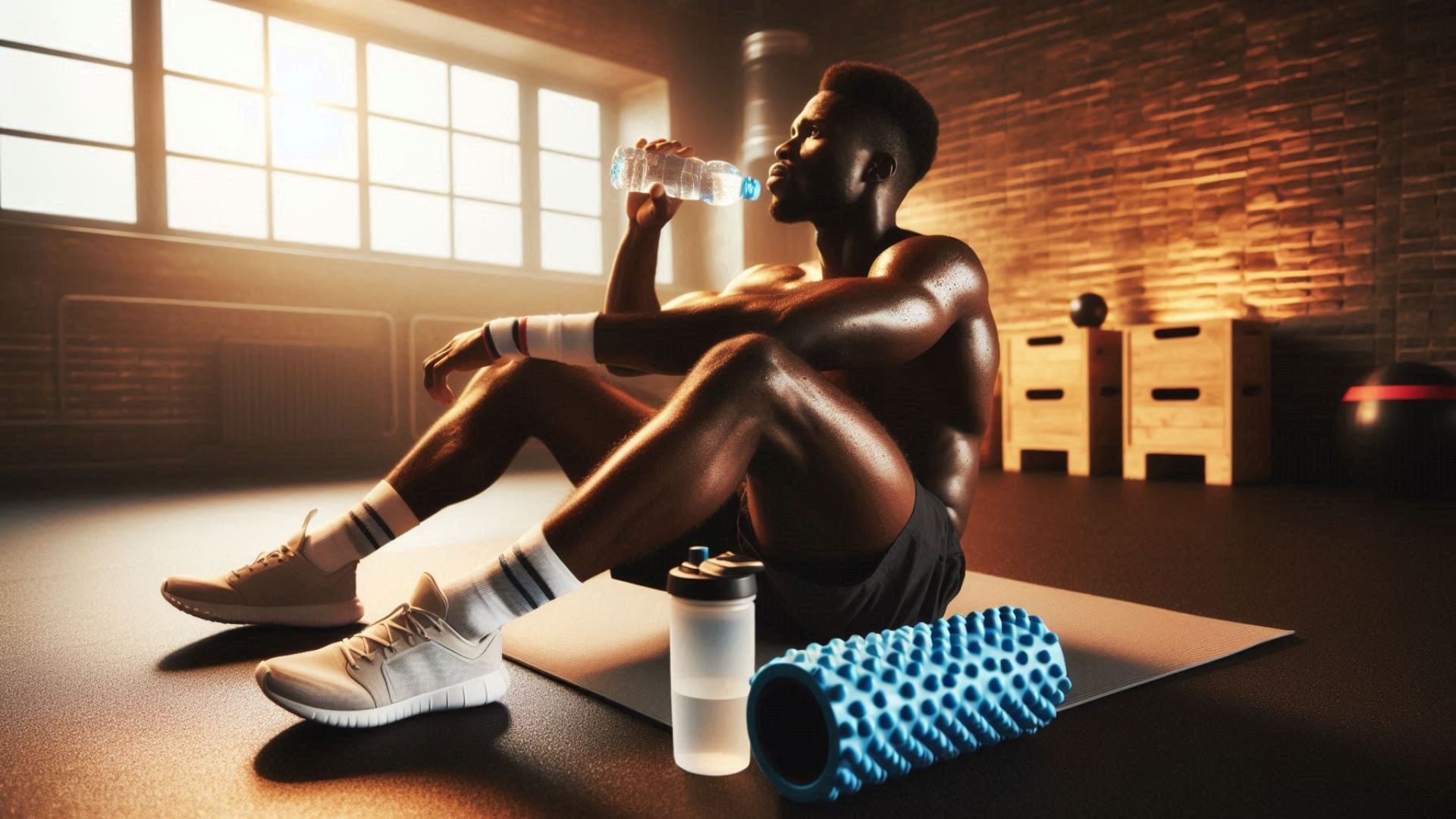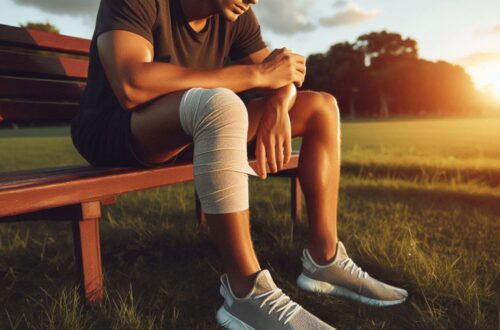If you’ve ever pushed hard in the gym, tried a new workout style, or gotten back into fitness after a break, you probably know the feeling—sore, stiff muscles that show up a day or two later. This is called delayed-onset muscle soreness (DOMS), and it’s a completely normal part of the muscle-repair process.
A little soreness is a good sign—it means you’ve challenged your body. But being so sore that you can’t walk up the stairs or stick to your workout plan? That’s no fun. The good news is there are science-backed ways to recover faster so you can keep making progress without feeling miserable.
In this guide, you’ll learn 15 proven strategies to speed up muscle recovery after workouts. From simple hydration and nutrition tweaks to recovery techniques used by athletes, these tips will help you recover smarter and train harder.
Quick Tips for Muscle Recovery
If you’re wIf you’re short on time, here’s the quick recovery checklist:
- Drink enough water (at least 2 liters daily).
- Take rest days—your muscles grow when you rest.
- Get 7–9 hours of sleep for optimal repair.
- Eat protein with every meal to rebuild muscle fibers.
- Stretch after workouts to improve flexibility.
- Stay active with light movement like walking.
Now, let’s dive deeper into each recovery strategy.
Stay Hydrated
Water is the foundation of muscle recovery. Your body needs fluids to transport nutrients, regulate temperature, and flush out toxins. Even mild dehydration can slow recovery and make soreness worse.

👉 Aim for at least 2 liters of water per day. If you sweat heavily, live in a hot climate, or train intensely, you may need more.
Do you need sports drinks?
Not necessarily. A balanced diet with fruits and veggies usually provides enough electrolytes. If you want a natural option, try:
- Coconut water (natural electrolytes)
- A smoothie with bananas and berries
- A glass of milk post-workout
📖 Related reading: Hydration and Health – CDC
Eat Enough Protein
Protein is your body’s muscle repair tool. When you exercise, tiny tears form in your muscle fibers. Protein helps repair and rebuild those fibers, making them stronger.
Experts recommend 15–30% of daily calories from protein. Since your body can’t absorb huge amounts at once, spread your protein intake throughout the day.
✅ Great protein sources:
- Eggs, chicken, fish, lean beef
- Greek yogurt, cottage cheese
- Tofu, quinoa, beans, and nuts (for plant-based diets)
💡 Pro Tip: After a workout, go for a protein + carb snack (like a protein shake with a banana). This speeds up recovery and restores energy.
📖 See: Protein and Exercise – Harvard Health

Also Read: How can I Relieve Joint Pain at Home with Natural Ingredients?
Do You Need Supplements?
Whole foods should be your main source of nutrition, but supplements can fill gaps if needed.
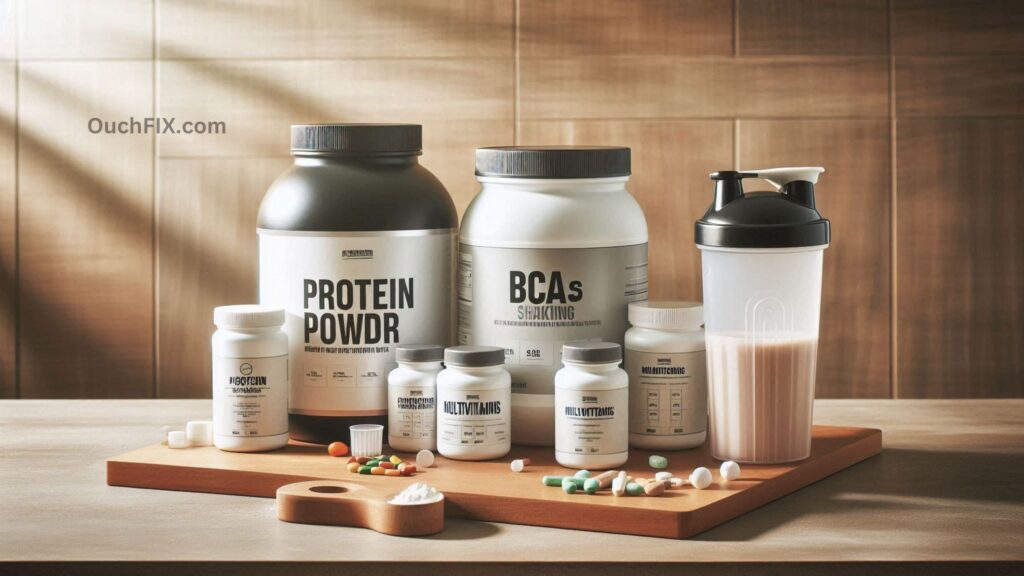
- Magnesium → supports muscle relaxation (found in spinach, nuts, whole grains).
- Omega-3 fatty acids → reduce inflammation (found in salmon, chia seeds).
- BCAAs (branched-chain amino acids) → may reduce soreness, but research is mixed.
💡 Before spending on supplements, get a blood test or consult a doctor to see if you actually need them.
Warm Up Before You Work Out
Jumping straight into heavy lifting or intense cardio without warming up is a recipe for soreness (and injuries). A proper warm-up activates your muscles and improves circulation.
✅ Warm-up ideas (5–10 minutes):
- Dynamic stretches (arm circles, leg swings)
- Light jogging or brisk walking
- Jumping jacks or jump rope
Cool Down After Exercise
Cooling down is just as important as warming up. It helps regulate your heart rate, improves flexibility, and prevents stiffness.

✅ Cool-down ideas (5–10 minutes):
- Light cycling or walking
- Static stretches (hamstring stretch, quad stretch, shoulder stretch)
- Yoga poses like child’s pose or downward dog
💡 Try stretching before bed if tight muscles affect your sleep.
Try Foam Rolling
Foam rolling acts like a DIY massage. It helps release tight muscles and improves blood flow.
👉 Spend 5–10 minutes foam rolling after workouts, focusing on sore areas like calves, quads, and hamstrings.
If you’re new, start slow—it might feel uncomfortable at first, but it gets easier.
Elevate Your Legs
Most of the day, your legs are either moving or at ground level. Elevating them helps improve circulation and reduce swelling.

👉 Try the legs-up-the-wall pose: Lie on your back and rest your legs vertically against a wall for 5–10 minutes. It’s relaxing and promotes recovery.
Take a Cool Bath or Shower
Soreness happens because of tiny tears in muscle fibers—a natural part of building strength. Cold therapy helps reduce inflammation.
Options include:
- Cool shower after training
- Ice bath (if you can handle it)
- Contrast therapy (alternating hot and cold water)
⚠️ If you have heart conditions or circulation issues, check with your doctor before trying these methods.

Also Read: What Practices Aid Recovery After a Sprain?
Don’t Skip Rest Days
Your muscles don’t grow in the gym—they grow while you rest. Overtraining can lead to fatigue, injuries, and slower results.

👉 Schedule at least 1–2 rest days per week. And remember: sleep is the ultimate recovery tool. Aim for 7–9 hours per night.
Stay Active Between Workouts
“Active recovery” means doing light movement on rest days. Research shows it helps increase blood flow and reduce soreness.
✅ Examples of active recovery:
- Gentle yoga or stretching
- Walking or light jogging
- Swimming at an easy pace
Wear Compression Clothing
Compression gear isn’t just a fitness trend. Studies suggest it can:
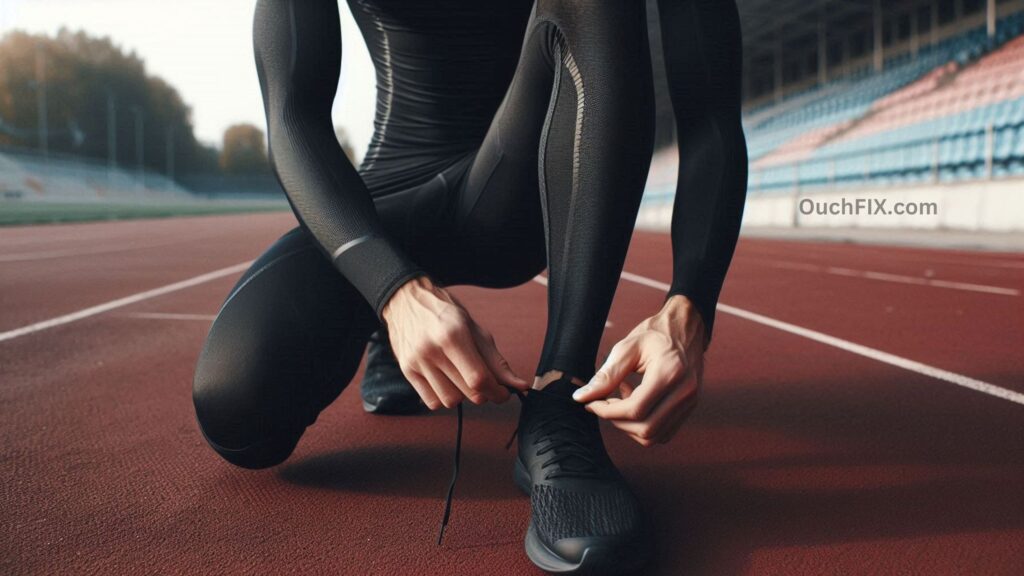
- Improve circulation
- Reduce muscle swelling
- Speed up recovery
Compression tights or socks are especially helpful after long runs or heavy leg days.
Manage Stress
Did you know that stress can slow down muscle recovery? High stress levels can interfere with sleep, Did you know stress slows muscle recovery? High stress raises cortisol levels, which can affect sleep, hormones, and healing.
✅ Stress-busting activities:
- Meditation or deep breathing
- Journaling or gratitude practice
- Spending time with friends and family
- Yoga or tai chi
📖 Related: How Stress Affects Recovery – APA
Train Smart with Progressive Overload
Progressive overload means gradually increasing the difficulty of your workouts instead of going too hard, too fast.

👉 Example: Instead of doubling your weights in a week, increase by 5–10% gradually.
Remember—being sore is not the only sign of progress. You can still build strength without feeling wrecked after every session.

Also Read: How does Sleep Affect Recovery from Physical Injuries?
Listen to Your Body
Fitness isn’t one-size-fits-all. If something feels off, adjust.
- Too sore? Take a rest day.
- Weight feels heavy? Drop down a notch.
- Pain instead of soreness? Stop and check for injury.
Your body gives signals—respect them.
Bonus Tip: Prioritize Sleep Hygiene
Sleep is where your body does most of its recovery work. Poor sleep = slower healing.
✅ Sleep hygiene tips:
- Keep your room cool and dark
- Avoid screens 1 hour before bed
- Stick to a consistent sleep schedule
- Try magnesium-rich foods at dinner for relaxation
Conclusion
Muscle soreness is part of the fitness journey, but it doesn’t have to hold you back. By focusing on hydration, nutrition, sleep, and smart training strategies, you can recover faster, feel better, and get stronger with each workout.
👉 Remember: Rest is not laziness—it’s part of the process. Train smart, listen to your body, and let recovery be your secret weapon to long-term fitness success.
FAQs About Muscle Recovery
How long does it take for muscles to recover?
Most muscles recover in 24–72 hours, depending on workout intensity, nutrition, and sleep.
Is soreness a sign of a good workout?
Not always. Progress comes from consistency, not from how sore you feel.
Should I work out if I’m still sore?
Mild soreness is fine, but if you’re in pain, take a rest or do light active recovery.
Do massages help with muscle recovery?
Yes! Massages improve circulation, reduce stiffness, and promote relaxation.
Is it okay to take painkillers for soreness?
Occasional use is fine, but overuse can mask injuries. Stick to natural recovery methods when possible.
